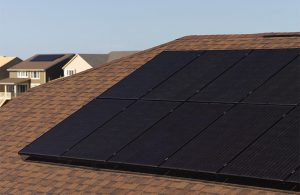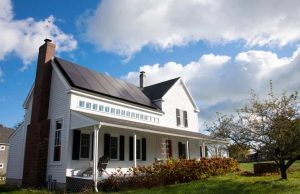Which Is Best for You?

The festival season of Diwali is one of the seasons where the state and central governments try to curb the pollution in Delhi NCR by limiting or banning the usage of power generators. Looking at the current scenarios both the governments may take a decision to ban the usage of power generators in marriage.
Case Study – 1: Om Garden

The 1st case study is of ‘Om Garden’ in New Delhi, where the local vegetable vendors install their vegetable vending shops in the garden. The Loom Solar team asked the local vegetable vendors about ‘how they manage to get the electricity?’
As the vegetable shops requires electricity to keep their lights, mobile charging, etc running through the night. As usual, all the vegetable shops are busy in the nigh time compared to the day time. So, to fulfil the power requirement, the local vegetable vendors use generators.
How much electricity is required to run the shops?
On an average a complete vegetable shop requires, nearly 100-watt electrical power, whereas a vegetable shop at a vegetable market requires nearly 50-watt electrical power to run through the night. Given the facts that a complete vegetable shop requires nearly 5-kilowatt energy which can be produced by a generator of 10-kilowatt.
On the given scenario, on an average, if a generator is switched on for 6 to 7 hours, then it will consume nearly 2,000 rs. every day. Calculating it to a month then a generator will consume nearly 60,000 rs. in a month if kept running for 6 to 7 hours a day.
What is the alternative option of Generators?
The only best solution / alternate for this situation is to switch for the clean and green and cost-effective option. Switching for Solar Panels is the best option for vegetable vendors. A solar panel of 5-to-10-kilowatt energy efficiency can fulfil the requirement of power of vegetable vendors. Solar panel usage can cut down the cost for power requirement by up to 50% or even more by proper usage.
Case Study – 2: Shristi Marriage Hall

The second case is for those marriage halls which are occupied for marriage functions. All the marriage gardens are majorly occupied for 1 to 2 months of the year, then the rest of the year the marriage garden is occupied for small events like parties, professional and personal functions.
The requirement of electricity is constant and enormous because of the usage of heavy watt lights, music DJ, room TVs, room ACs, room Heaters, etc. In this situation the need of the generator becomes mandatory for these gardens.
Opting for solar panels will save so much amount of money and will self-perpetuate the business of the garden.
Which states are the in the top list of using solar panels for garden?
In the current time, there a few states that uses solar panels for their marriage garden business. The state of Assam, Goa, Uttarakhand, Himachal Pradesh, Karnataka, etc. uses solar panels.
How much watt capacity is required in the solar system?
The minimum watt capacity requirement for a solar system is 30-kilowatt or a 50-kilowatt solar system can sufficiently fulfil the power requirement of the area, also the usage of the solar system make the business a self-sustainable business.
*(In our one of the most recent work. Loom Solar installed a 100 kW solar system in a marriage hall in Patna. Now, the marriage hall in Patna does not require any power source be it government’s or private to run through the daily power requirement for the marriage hall. The marriage hall has become self-sustainable).
How much will it cost?
On an average the price for a 30 kW solar system will be around rs. 30 lakhs and for a 50 kW solar system will be around rs. 50 lakhs.
*(as the watt capacity goes up, the price will also rise-up).
Where will the solar panel be installed?
The area required for the installation for a solar system is the ‘High Rise Structure’ area (basically the rooftop of the marriage hall). If the rooftop is not quite high, then there will be a need to install the high-rise structure to later install the solar system. The solar system area can also be used as another rooftop made out of solar panels.
In some cases, when the rooftop area is too small or not quite enough to install the solar system, then the Bi-facial Solar System is installed in the minimum area of the rooftop. Bi-facial solar system can generate more power than a normal solar system but are more costly than the normal solar systems.
What more components will it include?
In the installation pack, there will be Lithium-Ion Battery and an Inverter will be included along with the solar panels and its other electrical components.
*(For your information, the Lithium-ion battery that is provided by Loom Solar is known as CAML 100, which is built with the latest available technology. The single battery is as strong as 4 other batteries combined together. Loom Solar also provide a beautiful cabinet with the battery to make your place more beautiful than before.)
How to apply for Solar Loan?
A solar loan can be beneficial for a marriage hall business as the solar loan can provide some help in financing the solar systems of rs 30 to 50 lakhs.
*(For your information, the marriage hall business comes under MSME scheme of the Indian government which make the business eligible for a solar loan of up to 70% to 80% for financing the solar system for the marriage hall business.)
*(To apply for ‘Solar Loan’ visit our website at – https://loan.loomsolar.com/)





